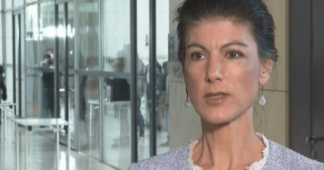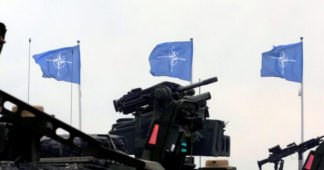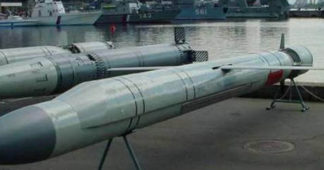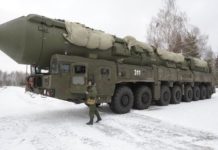Originally published: junge Welt
May 21, 2022 by Jan Greve
Jan Greve: Russia’s war against Ukraine is now taking almost three months. The federal government’s answer to this was: upgrade and deliver weapons. Do you agree with Chancellor Olaf Scholz: Are we currently experiencing a “turn of the century”?
Oskar Lafontaine: No, this is not a turning point–at least with regard to the geopolitical situation. We have long been in a phase in which Russia and China are being militarily encircled by the USA. For 20 years, Moscow has been pointing out that Ukraine must not be admitted to NATO. This means that U.S. missiles may not be placed on the Ukrainian-Russian border. These security interests were consistently ignored. This is one of the decisive reasons for the outbreak of the Ukraine war.
JG: The government in Kiev, as well as those in Warsaw or Budapest, can confidently decide on joining NATO, according to the Western War Alliance. That’s not the case?
OL: The argument that each state can decide for itself which alliance to enters is dishonest. Everyone knows that the U.S. would never accept Cuba’s accession to a military alliance with Russia, nor would the installation of Russian missiles on the U.S. border with Mexico or Canada.
Ultimately, this is not about admission to NATO. The crucial question is: Can missiles be placed at the borders of a nuclear power that have no warning period? This was already a big issue in the peace movement of the 1980s. At that time, it was about the deployment of Pershing II missiles in the FRG, against which we demonstrated. Their flight time to Moscow would have been only about ten minutes. From the Ukrainian-Russian border, the flight time is even shorter.
JG: How do you think the Ukraine war can be ended? In this country, there is louder and louder that there will be no so-called dictation peace of Russia.
OL: To answer this question, we need to understand the conflict. Three phases can be distinguished. The first was NATO’s eastward enlargement. Many important voices in the USA have also strongly warned against this. Even then, it was predicted that such a step would lead to a military conflict with Russia. The second phase began with Vladimir Putin’s decision to invade Ukraine. I condemn this war, just as I condemn without any restriction all other wars contrary to international law. The third phase, of which the German public has not yet noticed, is the beginning war of attrition of Joe Biden. The 40 billion dollars that the U.S. Congress provided last week mainly for arms deliveries to Ukraine are proof that the U.S. does not want peace. They want to weaken their rival Russia and say so openly.
JG: The local debate is also primarily about ever new arms deliveries. For decades, German foreign policy had the principle that no weapons are delivered to crisis areas. Did you think this change of course was possible?
OL: Over the past few decades, I have had to learn that political convictions always do not last. Nevertheless, I was surprised how quickly such a central principle is thrown overboard. Regardless of whether the weapons for Ukraine come from the USA or from the EU, these supplies prolong the war, more and more people will die.
JG: Meanwhile, the supporters of this escalation policy have hijacked the argument for themselves and claim that the war would be prolonged if more and more weapons were not provided. They agree: Russia is to be defeated on the battlefield.
OL: Unfortunately, these people only think in the categories of victory or defeat. But the most important thing, saving lives, obviously does not matter. If you do not want more people to die, you must be against any extension of the war and thus also against every supply of weapons. The argument that this armament would protect Ukraine is implausible. Nobody came up with the idea of supporting the countries invaded by the USA with the supply of German weapons. This shows how deceitful things are with us at the moment.
JG: In addition to arms deliveries, the West reacts with sanctions against Russia. It is emphasized that everything possible below the immediate entry into the war should be done to defeat Russia. Foreign Minister and Green politician Annalena Baerbock spoke of ruining the country. The zeal that shows itself here is unparalleled.
OL: That’s how it is. Especially since the sanctions are increasingly harming people in this country–especially those with low incomes who can no longer pay their energy bills. Due to the stupidity of the Greens, the other politicians of the traffic light coalition, but also the CDU/CSU supporting them, German companies are losing their competitiveness. We shoot ourselves in the knees. The USA is probably laughing at us because it is hardly affected by the sanctions, can now sell its liquefied gas to a greater extent in Europe and its arms industry is doing huge business.
JG: It is not new that the USA is trying to drive a wedge between the FRG and Russia. Is the United States the winner of the current situation?
OL: In the short term, yes. Through NATO’s eastward enlargement and Putin’s ill-considered decision to start the war, the U.S. has achieved its goal of inciting Russia and Germany against each other. In the long term, however, they make a serious mistake by pushing Russia to the side of China. In this way, they will strengthen the country, which is declared to be the main rival of the USA. On the other hand, we have to note that the Germans are not able to act in accordance with their own interests. Instead, you do great harm to yourself in the role of the faithful vassal of the USA.
JG: How would you explain to an inexperienced voter that the federal government is making policy against German interests?
OL: The decisive factor is the entry of the Greens into the government. Since the Yugoslavia war and the role of the then Foreign Minister Joschka Fischer, it has been clear that the Greens are the extended arm of the USA in the Bundestag. They support every U.S. decision when it comes to wars. They call themselves the Human Rights Party, but only know the violation of human rights by Russia or China. The one-eyed Greens do not see that the USA is responsible for most human rights violations as a result of its wars. Incidentally, the press also plays an evil role, which is just as blind to the war crimes of the USA and can be used for the incitement of war.
JG: The federal government, in the person of Minister of Economic Affairs Robert Habeck, also a Green politician, is relatively frankly proclaiming that “all of us” would lose prosperity in the future. More expensive energy or food is the price we would have to pay to stop the war. Who pays for the government’s policy?
OL: Habeck or Baerbock can only act in this way because the Greens have become the party of the better earners. If they still knew about the living conditions of those who have low incomes, they would not talk so stupidly. Ultimately, it is these people who will pay the bill for the “green” price driver. In the longer term, jobs will be lost. The purchase of cheap energy from Russia was a major location advantage for the German economy. It is now being ruined at the instigation of the Greens. And the German economy does not resist enough.
JG: Awareness of the consequences of this policy does not seem to have yet been sufficiently developed among those affected.
OL: In my opinion, a larger part of the population is now aware that with the supply of weapons, the risk of war for Germany is also growing and that prices continue to rise. I hope that the consequences of this wrong policy will be recognized and that there will be protests and countermovements. Unfortunately, many opponents of the war have stayed away from the NRW election. The “green” warmongers have benefited from this.
JG: You mentioned the role of the media in this country. In view of the uniform reporting of the bourgeois press regarding Russia, the question arises how a relevant part of the population should come up with critical thoughts.
OL: It is crucial that people increasingly feel the consequences of this policy in their wallets. In addition, despite the ongoing hate speech of war, more and more people are seeing the dangers associated with it. Last but not least, the Federal Chancellor himself drew attention to the risk of an expanding war up to a nuclear attack.
JG: In addition to arms deliveries, the federal government wants to drastically increase the defense budget and anchor a so-called special fund for the Bundeswehr in the Basic Law. Where will FDP Finance Minister Christian Lindner put the cut to finance the rearmament?
OL: If it will be a matter of reducing the debt in the future, the FDP will primarily think of the social budget. Lindner will represent the interests of his clientele, i.e. the better earners and the economy. Amazing: When it comes to energy prices, the FDP politician acts against the interests of the economy. If he were to recognize the consequences of the current policy for the German economy, he would have to threaten the FDP to withdraw from the coalition.
JG: With regard to the war and impoverishment policy of the “red-green” federal government under Gerhard Schröder, it is not surprising that it is now the SPD, Greens and FDP that set the armament course.
OL: That didn’t surprise me. One must see the changes that have taken place in the traffic light parties. The SPD is no longer Willy Brandt’s party, which promoted peace, disarmament and social improvements. The current Social Democratic Chancellor Scholz advocates rearmament and social dismantling. The Greens, who once had a strong pacifist wing, have become the greatest warmongers in Germany since the Yugoslavia war. And the FDP has no one of the format of the former Foreign Minister Hans-Dietrich Genscher or Guido Westerwelle. Genscher tried everything to prevent a policy that makes nuclear war limited to Europe more likely. And Westerwelle had the courage to show the Americans the cold shoulder in the Libyan war.
JG: SPD co-chairman Lars Klingbeil declared outdated the principle that peace and security in Europe can only be maintained with and not against Russia. How do you look at the development of the party of which you chaired from 1995 to 1999?
OL: Anyone these days who denies that peace in Europe requires co-existence with Russia needs to have their mental state examined. The policy of détente has led to peace in Europe, including for the Eastern European states. On the other hand, the policy of confrontation, which began after the fall of the Wall and which was carried out by the USA, led first to the Yugoslavia war and now to the Ukraine war. Basically, it should not be difficult to understand that relaxation, i.e. the attempt to communicate, leads to peace and confrontation eventually leads to war. However, we live in times of great spiritual confusion.
JG: Under the title “Living without NATO – Ideas for Peace” a congress will take place in Berlin this Saturday, where you will talk about the Ukraine war as a speaker. You have outlined the challenges for the German peace movement. Does it live up to those in its current constitution?
OL: No. But many are concerned that the war will spread. Therefore, it would now be necessary to take to the streets again in large numbers in the tradition of the peace movement of the 80s or the demonstrations before the Iraq war.
JG: The tasks described should also be of central importance for the Left Party. In March, you declared your withdrawal from the party you once co-founded. Do you have to understand this step in such a way that you no longer see your peace policy positions represented there?
OL: No longer to a sufficient extent. There have always been attempts to become “capable of governing” as a party. Some want to change the program so that they support wars mandated by the UN and to decide the issue of arms deliveries on a case-by-case basis. For many years, these attempts went nowhere. When Scholz then announced the “turn of the century” in his Bundestag speech, there was a push by deputies in the parliamentary group to approve the former group chairman Gregor Gysi and the then party leader Susanne Hennig-Wellsow to the armament motion. Thank God, those who pleaded for the rejection of this motion prevailed at the last moment. However, the discussion in the party afterwards shows that further attempts are being made to put the left on a similar course as the SPD and the Greens. If the course is really set at the party congress at the end of June, then the party has settled.
JG: They do not seem to assume that the left-wing forces within the party can still turn the tide.
OL: There is still a chance. But for this it must be understood that it is about how voters assess the policy of the Left Party – not which group a majority organizes at the party congress. It is not only in the party The Left that there is great mistake to believe that it is democracy if you find a majority in internal disputes. In democracy, however, the majority must be found among the population, not at party congresses.
JG: Without the broad protests against the “Agenda 2010” policy, the first successful years of the party The Left would not have been possible. This was a special historical starting point. The current circumstances give rise to doubt that a new left-wing party could soon be elected to the Bundestag.
OL: Where left-wing politics is successful, the correct program is represented. When we primarily campaigned for the interests of employees–without losing sight of climate protection – we were successful. Ever since that policy was changed a few years ago, we’ve been losing the elections. The conclusions to be drawn from this are obvious. It is almost ridiculous to assume that there is no potential for a party that puts peacekeeping and social concerns first. Especially when you see the extent to which the socially disadvantaged are now being impoverished by the federal government’s foolish policies. A left-wing party that represents the real interests of the majority of the population would now have more support than the Greens.
We remind our readers that publication of articles on our site does not mean that we agree with what is written. Our policy is to publish anything which we consider of interest, so as to assist our readers in forming their opinions. Sometimes we even publish articles with which we totally disagree, since we believe it is important for our readers to be informed on as wide a spectrum of views as possible.











